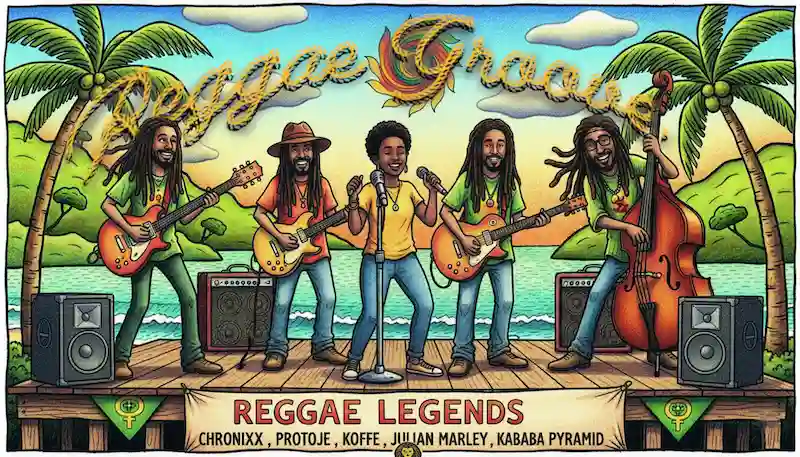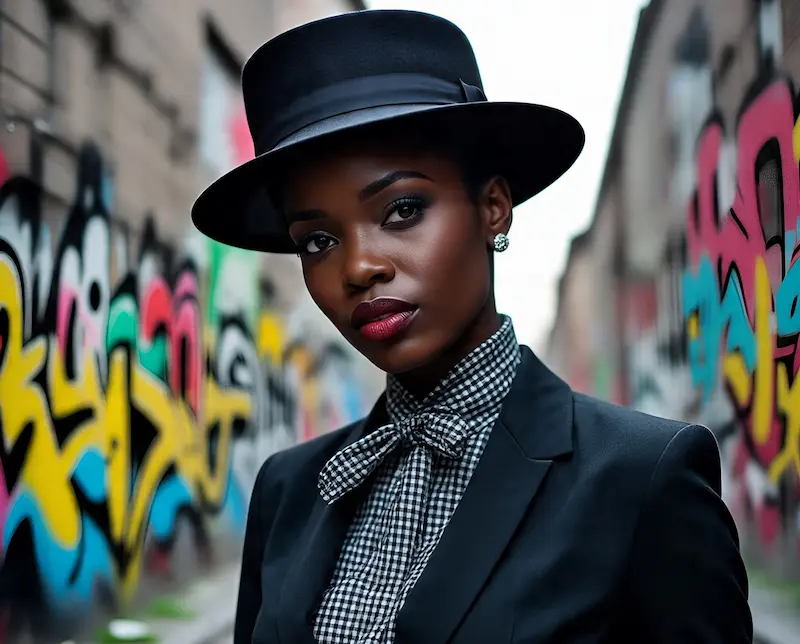
Introduction – Reggae as a Cultural Identity
More than just a musical style, reggae has always stood for a cultural movement, a philosophy, and a soundtrack for both solidarity and resistance.
Starting in Jamaica during the late 1960s, reggae amplified the voices of the marginalized, provided a rhythm for protest, and shared the spiritual teachings of Rastafari with the world. Bob Marley, Peter Tosh, Burning Spear, and numerous other trailblazers bestowed timeless vitality to reggae.
Reggae is more than simply a throwback, though. Today, a new wave of modern reggae artists is taking on this legacy, blending traditional roots with new influences to keep the sound fresh for a global audience.
What makes this current generation intriguing is how they balance honoring foundational rhythms while exploring new directions. Some incorporate hip-hop and dancehall, while others draw from soul, jazz, or even electronic music. Nevertheless, the message of reggae—love, liberation, spirituality, and social commentary—remains central.
At a Glance: Modern Reggae Artists You Should Know
- Chronixx – The Voice of a Generation
- Koffee – Redefining Reggae Stardom
- Protoje – Bridging Tradition and Innovation
- Kabaka Pyramid – The Conscious Lyricist
- Jah9 – Spiritual Feminine Energy in Reggae
- Julian Marley – Carrying the Family Torch Forward
These current reggae artists represent a vibrant cross-section of reggae’s evolution in the 21st century. Let’s take a closer look.

1. Chronixx – The Voice of a Generation
A Brief Bio
Born Jamar McNaughton in Spanish Town, Jamaica, Chronixx emerged in the early 2010s as a leading figure of what many call the “Reggae Revival.” Raised in a musical family, where his father was a singer known as Chronicle, Chronixx soaked up reggae’s golden era from a young age while remaining attuned to contemporary sounds.
Unique Style
Roots reggae is a strong influence on Chronixx’s music, which is elevated by contemporary production methods. His lyrics often reflect Marley’s social awareness, addressing issues of inequality, spirituality, and identity while offering melodies that resonate with younger audiences. His unique sound feels both ageless and innovative—a combination that resonates with reggae enthusiasts as well as newcomers.
Key Song to Hear
“Here Comes Trouble” is an anthem of resistance and one of his defining tracks. His 2017 album Chronology solidified his status as a leader among modern reggae singers, earning Grammy nominations and international recognition. Many people agree that Chronixx was a major contributor to the Reggae Revival, a movement that restored roots reggae’s prominence. .
Why He Matters Today
Chronixx continues to inspire a new generation of fans, demonstrating that roots reggae can thrive in a world of digital streaming and global music festivals.

2. Koffee – Redefining Reggae Stardom

A Brief Bio
The Jamaican singer-songwriter Mikayla Simpson, better known by her stage name Koffee, was born in Spanish Town in 2000. Her ascent has been astounding; with her 2019 project Rapture, she became the youngest and only female to win the Grammy for Best Reggae Album at the age of just 19.
Unique Style
Koffee’s music crosses genres. While her foundation is reggae, she often mixes in dancehall, hip-hop, and even Afrobeats. Her uplifting lyrics, delivered with youthful energy, spread positivity and hope—a refreshing angle in today’s music scene. She embraces joy, ambition, and unity in addition to political and spiritual topics, unlike many of her predecessors..
Key Song to Hear
Her breakout single “Toast” has become a modern reggae anthem, played from Kingston street dances to global festivals. It shows how today’s reggae artists can express universal themes while retaining the Jamaican heartbeat.
Why She Matters Today
Koffee shows that reggae can be youthful, global, and friendly to crossover without losing its essence.

3. Protoje – Bridging Tradition and Innovation
A Brief Bio
Protoje, whose real name is Oje Ken Ollivierre, was born in Jamaica in 1981. 3.Protoje, who was raised surrounded by music as the son of famed vocalist Lorna Bennett, started to forge his own distinctive reggae career in the 2000s. By the 2010s, he became a key figure in the Reggae Revival alongside Chronixx.
Unique Style
Protoje expertly blends old and new. His music heavily draws on classic roots reggae, but he also incorporates hip-hop beats and alternative sounds. Lyrically, Protoje acts as both a storyteller and commentator. His verses discuss love, social injustice, and identity, all while embracing modern sounds.
Key Song to Hear
“Who Knows” (featuring Chronixx) has become one of the defining tracks of contemporary reggae. Its captivating rhythm and inspiring lyrics highlight how modern reggae artists are carrying the tradition forward. Like Chronixx, Protoje’s work is a cornerstone of the Reggae Revival.
Why He Matters Today
Protoje demonstrates how the core sound of reggae can remain current when combined with modern components like hip-hop and alternative beats.
4. Kabaka Pyramid – The Conscious Lyricist
A Brief Bio
Born Keron Salmon in Kingston, Kabaka Pyramid emerged from Jamaica’s underground music scene to gain recognition as a prominent figure in international reggae. His stage name, Kabaka, means “king” in Ugandan dialect, while “Pyramid” reflects his respect for African history and spirituality.
Unique Style
Kabaka Pyramid’s strength lies in his lyricism. As a self-proclaimed follower of both reggae and hip-hop, he creates songs rich in wordplay, social awareness, and spiritual insight. His music resonates with listeners seeking depth and reflection, making him a torchbearer of roots reggae ideals in today’s world.
Key Song to Hear
“Well Done” is one of his sharpest tracks and critiques political corruption with clever wit. His 2022 album The Kalling won the Grammy for Best Reggae Album, solidifying his place among the most respected modern reggae artists.
Why He Matters Today
Kabaka Pyramid shows that reggae’s tradition of pointed political commentary is still vital.

5. Jah9 – Spiritual Feminine Energy in Reggae
A Brief Bio
Janine Cunningham, who goes by the name Jah9, hails from Montego Bay, Jamaica. Growing up in a devoutly Christian home before later embracing Rastafari, Jah9 brings a deeply spiritual approach to reggae. She has emerged as a distinct feminine voice in a genre often dominated by men.
Unique Style
Jah9 refers to her sound as “jazz on dub,” combining deep, jazz-inspired vocal phrasing with roots reggae to create an enthralling blend. Her music is meditative, healing, and deeply rooted in spirituality. Lyrically, she emphasizes empowerment, wellness, and higher consciousness—messages that resonate far beyond Jamaica.
Key Song to Hear
“Avocado” from her 2020 album Note to Self showcases her playful yet conscious side, while “New Name” highlights her spiritual depth. Jah9 stands out as one of the most unique modern reggae singers today, offering a feminine, spiritual perspective that enriches the genre.
Why She Matters Today
Jah9 broadens the conversation in reggae by elevating women’s voices and spiritual viewpoints.
6. Julian Marley – Carrying the Family Torch Forward
A Brief Bio
Bob Marley’s son, Julian Marley, is also becoming legendary. He was born in London in 1975 and grew up in both Jamaica and England. As a true global citizen, Julian embodies reggae’s worldwide appeal. Even though Julian’s family name is very important, he has made his own way and become well-known, including winning the 2024 Grammy Award for Best Reggae Album with Colors of Royal.
Unique Style
Julian Marley’s music style exemplifies reggae fusion. The Grammy winning collaborative album Color of Royal, especially, blends reggae inspirations with the high energy bounce of dancehall. Marley and Antaeus use contemporary production to blend electronic elements into this dance focused album.
His songwriting often balances spiritual themes, messages of unity, and social issues, but his delivery feels fresh and contemporary. He honors his father’s legacy without simply imitating him—bringing reggae forward while keeping its timeless spirit intact.
Key Song to Hear
With its sumptuous production, upbeat lyrics, and a groove that ties the listener to reggae’s timeless pulse, the “Roll (Rodando Mr Sonic Remix)” dance focused track from “Colors of Royal” exemplifies Julian’s artistic abilities. His Grammy win reaffirmed his place among modern reggae artists shaping today’s sound.
Why He Matters Today
Winning the Grammy Award for Best Reggae Album category in 2024, Julian Marley shows how the legacy families of reggae still have an impact on the genre’s present and future.

Conclusion
Reggae’s enduring power lies in its ability to change while remaining true to its roots. From the rebellious chants of the 1970s to the globally conscious sounds of today, the message is clear: reggae is about truth, unity, and freedom.
The core of 21st-century reggae is represented by the six artists listed here: Julian Marley, Jah9, Koffee, Protoje, Kabaka Pyramid, and Chronix. Each brings their unique flavor, whether through innovative production, blending genres, or spiritual depth, yet all remain connected to the pulse of roots reggae.
For a deeper dive into reggae’s global journey, check out our feature on the Global Impact of Reggae. Together with the Reggae Revival, these modern voices ensure that reggae not only survives but thrives in contemporary music.
The beauty of reggae is its ability to embrace evolution without losing its essence, and these artists embody that spirit.
So, the next time you create your playlist, explore these modern reggae singers and bands—their songs may remind you why reggae continues to be one of the world’s most powerful and lasting musical movements.

People Also Ask (FAQ)
Quick Answers at a Glance
- What is the Reggae Revival? A cultural and musical movement in Jamaica during the 2010s that brought roots reggae back into focus.
- Who are the most famous reggae artists today? Chronixx, Koffee, Protoje, Kabaka Pyramid, Julian Marley.
- Is reggae music still popular? Yes—streaming platforms and festivals keep reggae alive worldwide.
- Why is reggae so spiritual? Because it is closely tied to Rastafarianism, spirituality, and social consciousness.
Who is the most famous modern reggae singer? Koffee is arguably the most globally recognized today.
What is the Reggae Revival?
The Reggae Revival refers to a cultural movement that began in the early 2010s. It was led by artists like Chronixx, Protoje, Jah9, and Kabaka Pyramid. The movement aimed to restore roots reggae’s central place in Jamaican music at a time when dancehall dominated the charts. The Revival placed a strong emphasis on live instrumentation, spirituality, and thoughtful lyrics.
Who are the most famous reggae artists today?
Some of the most famous current reggae artists include Chronixx, Koffee, Protoje, Kabaka Pyramid, and Julian Marley. Internationally, artists like Damian Marley and Sean Paul also remain highly influential.
Is reggae music still popular?
Yes—reggae continues to thrive worldwide. Music events such as the Sierra Nevada World Music Festival in the United States, the Rototom Sunsplash in Spain, and Rebel Salute in Jamaica. show its global reach. Streaming platforms such as Spotify and Apple Music have also introduced reggae to new audiences, helping it cross cultural and generational boundaries.
Why is reggae so spiritual?
Reggae’s spirituality stems from its deep ties to Rastafarianism. Many songs discuss Jah (God), redemption, and living in harmony with nature. Its meditative rhythms and uplifting messages give the genre a spiritual quality that resonates with people seeking meaning and connection.
Who is the most famous modern reggae singer?
Koffee is one of the most recognized modern reggae singers internationally, especially after her Grammy win. However, artists like Chronixx and Protoje are equally respected for their role in reshaping reggae for today’s audiences.
What makes modern reggae different from classic reggae?
Modern reggae often includes influences from hip-hop, R&B, and electronic music. While classic reggae relied heavily on analog production and traditional riddims, today’s artists experiment with digital sounds and global genres. Yet, the heart of reggae—conscious lyrics and a deep groove—remains the same.

